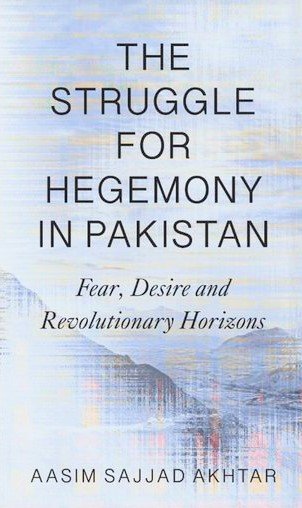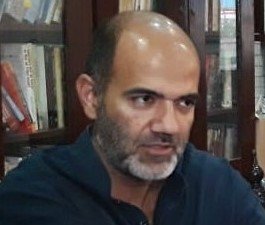Fear, Desire and Revolutionary Horizons
A new book discussing the rise of right-wing political forces and authoritarian personalities in the world including Pakistan has hit the stores.
Authored by noted academic and political activist Dr Aasim Sajjad Akhtar, the book, titled The Struggle for Hegemony in Pakistan Fear, Desire and Revolutionary Horizons is an interpretation of the contemporary global economic and political scenario and opportunities for revolutionary politics as an alternative. “The collapse of neoliberal hegemony in the Western world following the financial crash of 2007-8 and subsequent rise in the right-wing authoritarian personalities has been described as a crisis of ‘the political’ in the Western societies. But the crisis must be seen as a global, rather than focusing on the West alone.”
Published by Pluto Press, London, the book analysis the rapid financial and rapacious capture of natural resources in Pakistan, “overseen by the country’s military Establishment and state bureaucracy. Under their watch, trading and manufacturing interests, property developers and a plethora of mafias have monopolized the provision of basic needs like housing, water and food, whilst also feeding conspicuous consumption by a captive middle class.”
Aasim Sajjad Akhtar, an Associate Professor of Political Economy at the National Institute of Pakistan Studies, Quaid-e-Azam University, Islamabad, explores neoliberal Pakistan, looking at digital technology in enhancing mass surveillance, commodification and atomization as well as resistance to the state and capital. Presenting a new interpretation of our global political-economic moment, he argues for an emancipatory political horizon embodied by the ‘classless’ subject.
He is the author of three books, including The Politics of Common Sense: State, Society and Culture in Pakistan. He writes for Dawn, one of Pakistan’s leading and widely circulated newspapers.
The book has already received positivee reviews from academics, describing it as a major analysis of the world’s political crisis. The book is “a brilliant critique of the ideology of middle-class aspiration” writes Joel Wainwright, Professor at Ohio State University.
Barbara Harris-White, Emeritus Professor and Fellow, Wolfson College Oxford University write: It “shows how an aspirational idea of middle class reinforces the subordination of dispossessed labour, ethnic minorities in peripheral territories, “terrorists” and deviant dissenters”.
Sharing the news with a group of his party comrades and friends on Wednesday, Aasim said, “I am humbled to share that Pluto Press has just published my new book” which he described “a Gramsci-inspired effort to understand violent accumulation, fear and atomized desire in Pakistan’s postcolonial capitalist order.”
The book also offers reflections on the building of revolutionary politics in times to come.
“Lenin had said that there can be no revolutionary movement without revolutionary theory. It is in this spirit that I present a (barebones) theorization of ‘the political’.
In the wake of the widening polarization and extremism in Pakistani polity and society, the use and abuse of digital space by the ultra-right-wing extremist forces, and the identity politics, the author poses some pertinent questions to the scattered Left and progressives and how to engage with them and offer an alternative programme.
“We proudly resist class and caste power, militarised dispossession, patriarchal violence, oppression of peripheral ethnic nations, ecological destruction, imperialist wars, religious bigotry and authoritarianism. But resistance, if necessary, is not sufficient to create a new order?
“A sufficient political alternative demands a shared understanding of society, the state and the world in which we live. Only universalist politics within and across postcolonial countries can prevent planetary collapse and keep alive the dream of freedom for all peoples of the world.
This is why we must interrogate the social base of reactionaries as diverse as Imran Khan, TLP and right-wingers all over the world. Their success in persistently selling the politics of hate is not just an ideological fiction; it also feeds on the material aspirations of young people.
“Most of Pakistan’s population – like South Asia and Sub Saharan Africa in general – is young. Youthful political subjects predominate in digitalised social and political networks. Right-wing politics and military-industrial-media establishments is hegemonic in this digital terrain.
“Left-progressives also deploy digital networks to aid movements of resistance. But we MUST be more self-reflexive about their limitations.”
About the disunity of the Left and progressives, Aasim writes: “We are nowhere as united as the right. This disunity is partially explained by political communication that predominates in digital spaces. Digitally connected young people will nevertheless shape politics even more in the future.”
To transcend financialised capitalism and colonial statecraft, thereby preserving nature for future generations, he emphasizes the adaptation of the best traditions of anti-colonial revolutionary humanism.
“This means recognising our differences, but still coalescing around a shared project to fundamentally reorder wealth and resource distribution in favour of what Fanon called the wretched of the earth. There can be no progressive politics without centering the wretched of the earth.”
He hopes that many young progressives will engage with this book, however critically.
The Awami Workers Party of which Aasim is deputy general secretary will organise a series of book launches in weeks and months to come and will try to ensure that as many young activists who want can acquire the book.
“I hope that young activists will not only read it but will also be inspired to action. As Marx had said, philosophers have only interpreted the world. The point, however, is to change it. Solidarity to all who will respond in kind to my invitation to think through these questions. I retain hope that we will also join together in the struggle for our collective future!”

The High Asia Herald is a member of High Asia Media Group — a window to High Asia and Central Asia


